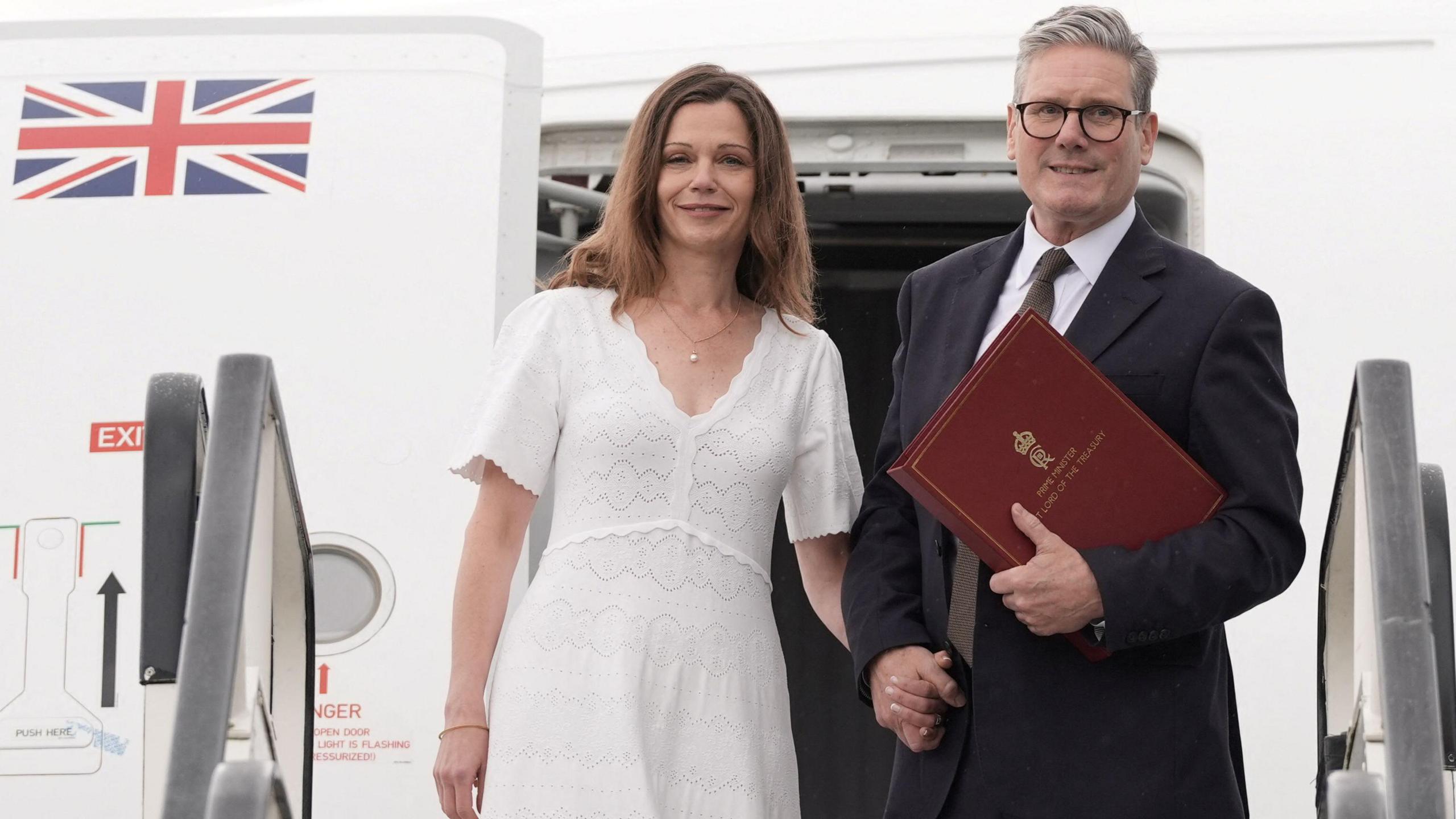PM says defence spending commitment 'cast iron'

Sir Keir Starmer boarded a plane to Washington with his wife Victoria on Tuesday evening
- Published
Prime Minister Sir Keir Starmer has said the UK has a "cast iron commitment" to spending 2.5% of national income on defence – but is still refusing to put a timeline on when the promise will be delivered.
Sir Keir has travelled to Washington for the annual summit of the Nato defence alliance, less than a week after he won the general election.
He and his wife Victoria have been invited to the White House by President Joe Biden.
The prime minister has said the new government will begin a review of the defence capabilities the country needs in the future, which will set out a "roadmap" to reaching the 2.5% target.
"At a time when we face multiple threats at home and abroad, we must make sure we are ready to defend ourselves," Sir Keir said.
"That’s why I have immediately ordered a root-and-branch review that will secure Britain’s defences for the future."
Speaking ahead of his departure to Washington, Sir Keir told reporters he was committed to spending 2.5% of GDP - a measure of the size of the economy - on defence "within our fiscal rules".
But he added: "That strategic review needs to come first."
This suggests it will not happen quickly.
Pressed by journalists travelling with him to Washington on where the 2.5% pledge stood in his priority list of spending, he said: “The defence and security of the nation... is the first priority of government. That is well understood by me.”
The prime minister added that the strategic review was “wider than the money question, it is obviously looking at the challenges that we face, the capabilities and making sure that the two match".
Speaking on the BBC's Today programme, Minister for the Armed Forces Luke Pollard said the defence review would take place next week and needed to happen before a timeline was confirmed.
He said: "That's partly why the defence review next week is so important, because we need to set out what the sequence of any increased spending will look like to make sure that we get there."
When asked whether defence spending would be directly linked to economic growth, Mr Pollard responded that growing the economy was "non-negotiable".
He added: "If we don't grow our economy there won't be the money to support those public services and the ambitions that we have, and that includes defence - and defence in itself can help that growth mission."
During the election campaign, the Conservatives pledged to reach 2.5% by 2030 and criticised Labour for not matching their commitment.
Labour has insisted it will hit the target when the nation's finances allow.
Nato members have pledged to spend at least 2% of their GDP on defence by 2024 - but many are falling short of the target.
Some 23 of the alliance's 32 member countries are projected to meet the target this year.
The UK currently spends just over 2% of its GDP on defence.
The PM is joined on this trip by Foreign Secretary David Lammy, Defence Secretary John Healey and the Paymaster General Nick Thomas-Symonds, who has a responsibility for the UK’s relations with its European neighbours.
Labour is very conscious the party is often not trusted on defence and national security – and so the language chosen by these new senior ministers is striking in its conviction, to try to underline that the party has changed from the era of Jeremy Corbyn’s leadership.
Mr Healey said "Britain’s commitment to Nato is unshakeable", while Mr Lammy said "Nato is part of Britain’s DNA".
Sir Keir said the summit "should be seen as a clear and united resolve by Nato allies … to stand with Ukraine and stand up to Russian aggression”.
He said the package of support for Ukraine the UK was seeking to advance at the Nato summit “goes beyond the support that's been put in before".
This trip will also provide the prime minister with a first chance to meet fellow world leaders in his new role.
It will be the first time he has ever met President Biden.
He has met other leaders of Nato member states before, such as President Emmanuel Macron of France and Chancellor Olaf Scholz of Germany.
